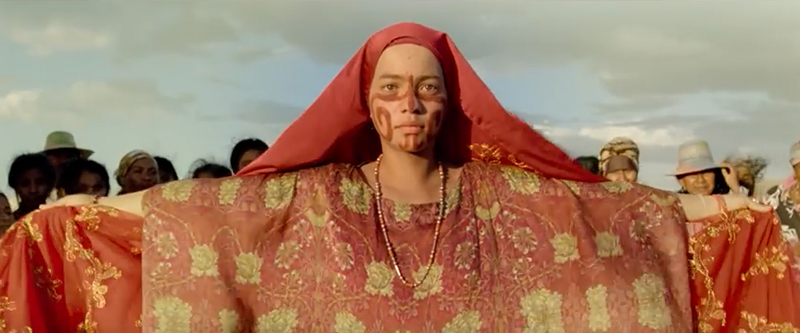Birds of Passage (Pájaros de verano)
Film Reviews
Birds of Passage (Pájaros de verano)
Directors: Cristina Gallego, Ciro Guerra
The Orchard
In theaters: 03.08
A lyrical and staggering epic, Birds of Passage unfurls its tale of one indigenous Wayúu family within the expansive Guajira Desert and the early Colombian drug war. After 2016’s stunning, Oscar-nominated Embrace of the Serpent, filmmakers Cristina Gallego and Ciro Guerra’s latest is a tightly wrung drug drama, set from 1968 to 1980 and sung across five acts (or cantos): “Wild Grass,” “The Graves,” “Prosperity,” “The War” and “Limbo.”
Early in the film, the young and beautiful Zaida (Natalia Reyes) dons a piercingly red shawl, a beaded necklace and face paint for her Wayúu coming-of-age ceremony. She dances swiftly, both arms outstretched to her sides, fabrics billowing magnificently in her coming-out celebration. A man named Raphayet (José Acosta) joins in her onrush. He intends to make her his wife, but Zaida’s mother, the unflinching matriarch Úrsula (Carmiña Martínez), disapproves. Although Raphayet’s uncle, Peregrino (José Vicente Cote), is a respected “word messenger” (a sacred mediator role), Raphayet is still poor. Úrsula thinks that he has spent too much time away from the Wayúu and among the alijunas—the outsiders. Zaida’s family demands a near-impossible dowry for her hand.
But Raphayet is determined to get the money. While black marketeering coffee and liquor with his capricious friend Moisés (Jhon Narváez), he meets a group of American Peace Corps volunteers looking for marijuana (they’re otherwise stationed to combat communism). After persuading Úrsula’s cousin, the patriarch Aníbal (Juan Martínez), to join in on the deal, Raphayet delivers the crop, secures the dowry, and marries Zaida.
Business booms, and the family prospers. But at a menacing, chant-like pace, so do double-crossing and dishonor, murder and miscalculations. Families clash and become ruthless, and their grasp on Wayúu land and tradition begins to slip. Birds, desert locusts, shrouds and dreams bring omen of catastrophe. Missteps and oversteps stumble into unforgivable acts and cascade into a fateful, fratricidal war of revenge. (“Do you know why I am respected?” asks Úrsula. “Because I am capable of anything for my family and clan.”)
Birds of Passage is a tautly composed rise-and-fall, a dynastic saga that feels massive and rigorously contained at once. Visually resplendent with brilliant, ominous sound editing, the film is fully immersed in its Indigenous perspective, but Gallego and Guerra do not seek to explain or make magical Wayúu culture. Nor do they sanctify—our families are the architects of their own undoing within the cruel legacy and rapacious appetite of the international drug trade.
Perhaps most of all, Birds of Passage is a testament of cultural memory. The film centers the Wayúu people, a glorious reënvisioning of both the contemporary filmic landscape and the history of the late-20th-century Colombian drug war. Before the onset of disruption and demise, Úrsula clings to the Wayúu way, to its totems and rituals and superstitions; after, Raphayet remains haunted by his ghosts. And so the five-song Birds of Passage epic concludes as it begins: with a lone Wayúu singer, intoning its tale. –Kathy Rong Zhou
